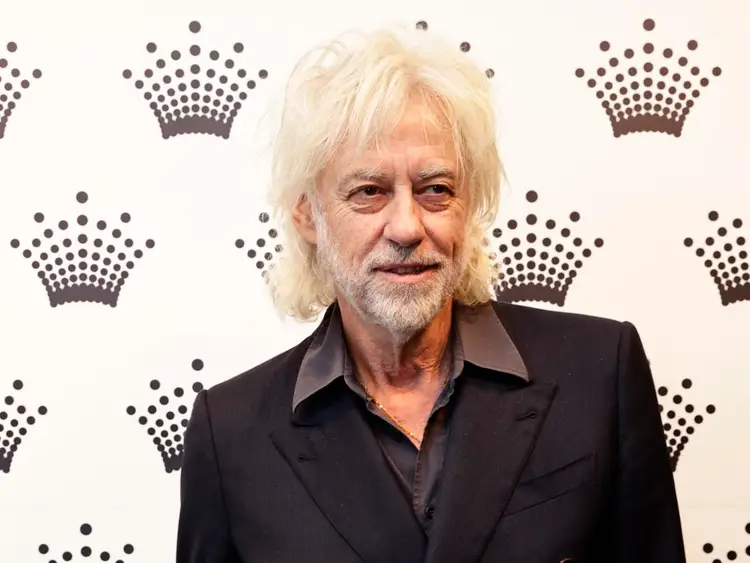Bob Geldof addresses backlash over Band Aid

What Have You Overlooked?
Bob Geldof has emphasized that the Band Aid charity single "Do They Know It’s Christmas?" is truly "incredible" and serves as "a tool for change," despite facing some recent criticism.
Since 1984, the fundraising track has generated millions in aid, and a new edition named Band Aid 40 has just been launched. This version incorporates earlier recordings and includes artists such as Bono and Ed Sheeran. However, some critics argue that the song reinforces negative stereotypes about Africa. Recently, Ed Sheeran stated on Instagram that if he had the opportunity, he would have opted out of having his vocals featured in this latest version.
Geldof, the creator of the charity supergroup, discussed the topic on The One Show. He expressed that he believes the song's ability to ignite discussions is precisely what makes it so “impactful.”
"Understanding The What, How, And Why"
The celebrity appeared on a BBC show on Monday, November 25, where host Angellica Bell inquired about his thoughts on the criticism he's faced.
He said, "For some reason, this song has turned into a tool for change. Just a couple of weeks ago, an American newspaper referred to it as possibly the most influential song in the history of rock ‘n’ roll."
"You start with those young kids who were struggling, and you follow their journey all the way to Live Aid. As more people begin to imitate what you're doing, it all comes together to create a concert. This concert raised around $480 million in just a week, generating a powerful movement for change. It brought issues to the forefront in political and economic discussions at important gatherings like the G8 and Live 8, leading to significant changes in the world's structures."
Bob Geldof discussed the immense impact of the song. (Screenshot from BBC)
"That's how I see it," the singer stated.
He continued, "People have varied views on it since, over the course of 40 years, perspectives and values evolve. That's what makes it so impactful. It accomplished everything I mentioned, yet it still sparks discussion when it's released. This discussion is amazing, and it's only possible because of this simple pop song. Without it, that discussion wouldn't even occur."
"Now that it's in the public eye and has been discussed and documented, we have gained significant political leverage once more."
Learn more: Bob Geldof
What makes Band Aid a topic of debate?
Bob Geldof: Listening to Band Aid makes me "absolutely furious"
Sir Bob Geldof once dispatched a thousand deceased rats to radio DJs.
"This song is truly incredible," Geldof shared. "I get so much energy and inspiration from hearing people express their thoughts on it. I almost slipped and used a curse word, but since it's only 1 PM, I’ll hold back. You get the idea!"
"It's definitely a key aspect of its purpose."
Bob Geldof, George Michael, and Bono during the Live Aid concert in 1985. (Image courtesy of Getty)
What Did Ed Sheeran Just Say?
Band Aid started in 1984 with a hit single and the Live Aid concert. Five years later, Band Aid II was released, and this was followed by anniversary editions: Band Aid 20, Band Aid 30, and now Band Aid 40.
In 2014, Sheeran contributed vocals to a rendition of the song, and those recordings were included in the newest version. He shared on his Instagram Story: "I wasn't asked for my permission regarding the new Band Aid 40 release, and if I had the option, I would have politely turned down the use of my voice."
Referring to a post by rapper Fuse ODG that took aim at foreign assistance in Africa, he shared: "Ten years later, my perspective on this topic has evolved, as @fuseodg articulately points out. This is simply my individual viewpoint, and I hope it’s a positive one. Sending love to everyone x."
Ed Sheeran mentioned that he would have opted out of participating in the new Band Aid project. (PA Images via Getty Images)
British-Ghanaian artist Fuse ODG took to social media to explain that he declined to participate in Band Aid 30. He expressed his belief that such fundraising initiatives contribute to harmful stereotypes.
He stated: "Although these portrayals might evoke compassion and lead to financial support, they also reinforce harmful stereotypes that hinder Africa's economic development, tourism, and investment opportunities. This ultimately results in significant losses for the continent, costing it trillions and undermining its dignity, pride, and sense of identity."
You can catch The One Show on BBC One every weekday at 7 PM.



















































